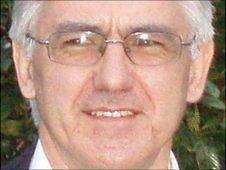Report into Island-wide voting in Guernsey is dismissed
- Published

Deputy Gillson said a more detailed report was needed
The States of Guernsey has blamed a lack of depth in a report into the issue for not making a decision on island-wide voting.
Deputies agreed to delay debate on the issue, after concerns were raised there was not enough information on how the new electoral system would work.
The motion to delay, brought by Deputy Peter Gillson, was passed 26-18.
Currently the island is divided into seven electoral districts, which each elects six or seven members of States.
Deputy Gillson said: "All I'm saying is show us it can work before we can decide, there is an element of fear.
"I've got a fear that actually island-wide voting could work and could be great, but on the back of this report I've got nothing to actual show me it would work."
Deputy Charles Parkinson, who announced he would stand down at the end of this term, said he supported island-wide voting and agreed that more research was needed.
The report, which put forward three options for electoral systems to be pursued, was put together by the States Assembly and Constitution Committee (SACC).
Deputy Matt Fallaize, the vice chairman of that committee, said there was no point delaying as it would not change the outcome of the debate.
During the debate he said to his fellow deputies: "Unless you genuinely believe that additional information on island-wide voting is likely to make you change your vote then please vote against the sursis.
"It is the worst form of procrastination, we should chuck it out and get on with the debate we came here for."
'Pros and cons'
Deputy Dave Jones said it was time to make a decision on the issue once and for all as "the public have been waiting for this debate".
In his sursis, the delaying motion, Deputy Gillson said: "The desire of this sursis is to instruct SACC to take a little time to produce a fuller report setting out in full the implications of their proposals, and detailed consideration of the pros and cons and consequences flowing from each of the options."
He added that he still expected the committee to be able to bring the new report back to the States to allow enough time for any changes to be brought in before the next deputies election in 2012.
This report was the second on the issue, after the eight options presented in the first report produced in January 2009 were reduced to three after debate of the first report and public consultation via a survey.
- Published15 June 2010